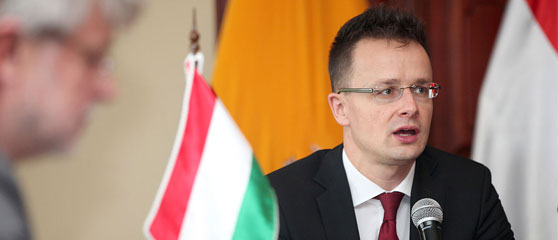A senior Hungarian official was “honoured” to meet President Rodrigo Duterte, the instigator of the Filipino drug war slaughter, amid rising tension between the EU and the Philippines.
Hungarian foreign minister, Péter Szijjártó, visited the Philippines in late March to reopen his country’s embassy, and to “intensify [Hungary’s] presence in the region”, Hungary Today reported.
Szijjártó met with President Duterte while in the Philippines, and praised the “highly beneficial” cooperation between the two countries, including the opening of “a 510-million-euro credit line to boost [Hungarian] exports to the Philippines”.
Notably, Szijjártó – who was the first foreign minister of an EU country to meet Duterte since he was inaugurated in June 2016 – did not specifically refer to the mass slaughter and human rights abuses that have occurred under the guise of the Philippines War on Drugs.
In an apparent attempt to excuse his avoidance of the subject, Szijjártó referred to the principle of national sovereignty.
“We understand that it’s only the Filipino people [who] have the right to make a decision about who is leading this country,” Szijjártó said, according to Business World.
“We expect others not to judge and criticise our domestic and internal developments.”
In early March, President Duterte was accused by Human Rights Watch of having "instigated and incited killings of mostly urban poor in a campaign that could amount to crimes against humanity", as part of his War on Drugs. Over 7,000 people are estimated to have been killed in the past nine months.
Duterte has also suggested that the Philippines will reinstate the death penalty, including for drug offences, despite having been one of the first countries in Southeast Asia to have prohibited the punishment.
A resolution by the EU Parliament noted that European officials were "deeply alarmed" by the prospect of the death penalty's reintroduction, adding that "the EU considers capital punishment to be a cruel and inhuman punishment, which fails to act as a deterrent to criminal behaviour".
Duterte, who has become notorious for expletive-ridden rants and a lack of adherence to traditional diplomatic etiquette, criticised the EU for supposedly attempting to impose their values upon the Philippines.
“Why don’t you mind your own business? Why do you have to f*** with us, goddamn it?” he said in a speech on March 20.
Szijjártó's meeting with Duterte on March 27, a mere week after the latter’s tirade at the EU, was thus particularly significant.
The Hungarian government has seemingly decided to disregard the on-going bloodshed of people who have not been charged with crimes, as well as the potential for capital punishment’s reintroduction, in favour of advancing "the best circumstances for investment in Europe".
Interestingly, following the Szijjártó-Duterte meeting, the latter’s government seems to have toned down its criticism of the EU.
"The message we’ll be sending to the EU of course is to reaffirm our strong relationship with the European Union, and our efforts to build up on that," acting Foreign Affairs Secretary Enrique Manalo said on March 30.
Perhaps, even when there are allegations of crimes against humanity, business deals may be prioritised.


